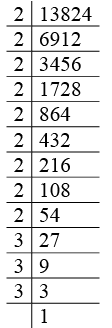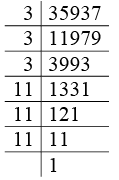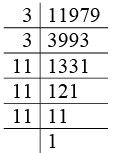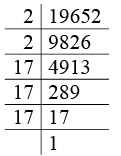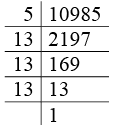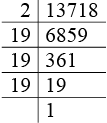ML Aggarwal: Cubes & Roots - 1 - Class 8 PDF Download
Q.1. Which of the following numbers are not perfect cubes? Give reasons in support of your answer:
(i) 648
(ii) 729
(iii) 8640
(iv) 8000
(i) 648
We have,
648 = 2 × 2 × 2 × 3 × 3 × 3 × 3
After grouping the prime factors in triplets, one factor 3 is left without grouping.
648 = (2 × 2 × 2) × (3 × 3 × 3) × 3
Thus, 648 is not a perfect cube.
(ii) 729
We have,
729 = 3 × 3 × 3 × 3 × 3 × 3
After grouping the prime factors in triplets, it’s seen that no factor is left.
729 = (3 × 3 × 3) × (3 × 3 × 3)
Thus, 729 is a perfect cube.
(iii) 8640
We have,
8640 = 2 × 2 × 2 × 2 × 2 × 2 × 3 × 3 × 3 × 5
After grouping the prime factors in triplets, it’s seen that one factor 5 is left without grouping.
8640 = (2 × 2 × 2) × (2 × 2 × 2) × (3 × 3 × 3) × 5
Thus, 8640 is not a perfect cube.
(iv) 8000
We have,
8000 = 2 × 2 × 2 × 2 × 2 × 2 × 5 × 5 × 5
After grouping the prime factors in triplets, it’s seen that no factor is left.
8000 = (2 × 2 × 2) × (2 × 2 × 2) × (5 × 5 × 5)
Thus, 8000 is a perfect cube.
Q.2. Show that each of the following numbers is a perfect cube. Also, find the number whose cube is the given number:
(i) 1728
(ii) 5832
(iii) 13824
(iv) 35937
(i) 1728
We have,
1728 = 2 × 2 × 2 × 2 × 2 × 2 × 3 × 3 × 3
After grouping the prime factors in triplets, it’s seen that no factor is left without grouping.
1728 = (2 × 2 × 2) × (2 × 2 × 2) × (3 × 3 × 3)
Thus, 1728 is a perfect cube and its cube root is 2 × 2 × 3 = 12.
(ii) 5832
We have,
5832 = 2 × 2 × 2 × 3 × 3 × 3 × 3 × 3 × 3
After grouping the prime factors in triplets, it’s seen that no factor is left without grouping.
5832 = (2 × 2 × 2) × (3 × 3 × 3) × (3 × 3 × 3)
Thus, 5832 is a perfect cube and its cube root is 2 × 3 × 3 = 18
(iii) 13824
We have,
13824 = 2 × 2 × 2 × 2 × 2 × 2 × 2 × 2 × 2 × 3 × 3 × 3
After grouping the prime factors in triplets, its seen that no factor is left without grouping.
13824 = (2 × 2 × 2) × (2 × 2 × 2) × (2 × 2 × 2) × (3 × 3 × 3)
Thus, 13824 is a perfect cube and its cube root is 2 × 2 × 2 × 3 = 24.
(iv) 35937
We have,
35937 = 3 × 3 × 3 × 11 × 11 × 11
After grouping the prime factors in triplets, it’s seen that no factor is left without grouping.
35937 = (3 × 3 × 3) × (11 × 11 × 11)
Thus, 35937 is a perfect cube and its cube root is 3 × 11 = 33
Q.3. Find the smallest number by which each of the following numbers must be multiplied to obtain a perfect cube:
(i) 243
(ii) 3072
(iii) 11979
(iv) 19652
(i) 243
We have,
243 = 3 × 3 × 3 × 3 × 3
After grouping the prime factors in triplets, it’s seen that factors 3 × 3 are left.
243 = (3 × 3 × 3) × 3 × 3
So, in order to complete in a group of 3’s, one more factor of 3 is needed.
Thus, the smallest number which should be multiplied to 243 in order to make it a perfect cube is 3.
(ii) 3072
We have,
3072 = 2 × 2 × 2 × 2 × 2 × 2 × 2 × 2 × 2 × 2 × 3
After grouping the prime factors in triplets, it’s seen that factor 2 × 3 are left ungrouped.
3072 = (2 × 2 × 2) × (2 × 2 × 2) × (2 × 2 × 2) × 2 × 3
So, in order to complete them in a group of 3’s we need the factors 2 × 2 × 3 × 3 to be multiplied.
i.e. the factor needed is 2 × 2 × 3 × 3 = 36
Thus, the smallest number which should be multiplied to 3072 in order to make it a perfect cube is 36.
(iii) 11979
We have,
11979 = 3 × 3 × 11 × 11 × 11
After grouping the prime factors in triplets, it’s seen that factors 3 × 3 are left without grouping in 3’s.
11979 = 3 × 3 × (11 × 11 × 11)
So, in order to complete in a group of 3’s, one more factor of 3 is needed.
Thus, the smallest number which should be multiplied to 11979 in order to make it a perfect cube is 3.
(iv) 19652
We have,
19652 = 2 × 2 × 17 × 17 × 17
After grouping the prime factors in triplets, it’s seen that factors 2 × 2 are left ungrouped in 3’s.
19652 = 2 × 2 × (17 × 17 × 17)
So, in order to complete it in a triplet one more 2 is needed.
Thus, the smallest number which should be multiplied to 19652 in order to make it a perfect cube is 2.
Q.4. Find the smallest number by which each of the following numbers must be divided to obtain a perfect cube:
(i) 1536
(ii) 10985
(iii) 28672
(iv) 13718
(i) 1536
We have,
1536 = 2 × 2 × 2 × 2 × 2 × 2 × 2 × 2 × 2 × 3
After grouping the prime factors in triplets, it’s seen that one factor 3 is left without grouping.
1536 = (2 × 2 × 2) × (2 × 2 × 2) × (2 × 2 × 2) × 3
So, in order to make it a perfect cube, it must be divided by 3.
Thus, the smallest number by which 1536 must be divided to obtain a perfect cube is 3.
(ii) 10985
We have,
10985 = 5 × 13 × 13 × 13
After grouping the prime factors in triplet, it’s seen that one factor 5 is left without grouping.
10985 = 5 × (13 × 13 × 13)
So, it must be divided by 5 in order to get a perfect cube.
Thus, the required smallest number is 5.
(iii) 28672
We have,
28672 = 2 × 2 × 2 × 2 × 2 × 2 × 2 × 2 × 2 × 2 × 2 × 2 × 7
After grouping the prime factors in triplets, it’s seen that one factor 7 is left without grouping.
28672 = (2 × 2 × 2) × (2 × 2 × 2) × (2 × 2 × 2) × (2 × 2 × 2) × 7
So, it must be divided by 7 in order to get a perfect cube.
Thus, the required smallest number is 7.
(iv) 13718
13718 = 2 × 19 × 19 × 19
After grouping the prime factors in triplets, it’s seen that one factor 2 is left without grouping.
13718 = 2 × (19 × 19 × 19)
So, it must be divided by 2 in order to get a perfect cube.
Thus, the required smallest number is 2.
Q.5. Rahul makes a cuboid of plasticine of sides 3 cm × 3 cm × 5 cm. How many such cuboids will he need to form a cube?
Given,
Cuboid with dimensions 3 cm × 3 cm × 5 cm
To form into a cube, number of such cuboid required are
=
= 5 × 5 × 3
= 75
Thus, the number of cuboids required to make a cube is 75.
Q.6. Find the volume of a cubical box whose surface area is 486 cm2.
Given,
Surface area of a cubical box = 486 cm2
We know that, Surface area of a cubical box = 6 × (side)2
So,
Now, volume = (Side)3
= (9)3
= 9 × 9 × 9 = 729 cm3
Thus, the volume of the cubical box is 729 cm3.
Q.7. Which of the following are cubes of even natural numbers or odd natural numbers:
(i) 125
(ii) 512
(iii) 1000
(iv) 2197
(v) 4096
(vi) 6859
We know that,
The cube of an even number is even and the cube of an odd number is odd.
Hence,
125, 2197, 6859 are cubes of an odd number and 512, 1000, 4096 are cubes of an even number.
Q.8. Write the ones digit of the cube of each of the following numbers:
(i) 231
(ii) 358
(iii) 419
(iv) 725
(v) 854
(vi) 987
(vii) 752
(viii) 893
We know that,
The cube of number having 1, 4, 5, 6 or 9 in unit place will end in 1, 4, 5, 6 or 9
And, if the numbers have:
2 in unit place, then it’s cube ends in 8
8 in unit place, then it’s cube ends in 2
3 in unit place then it’s cube ends in 7
7 in unit place then it’s cube ends in 3
0 in unit place then it’s cube ends in 0.
So now,
(i) Unit digit of number 231 is 1, hence its cube will end in 1.
(ii) Unit digit of number 358 is 8, hence its cube will end in 2.
(iii) Unit digit of number 419 is 9, hence its cube will end in 9.
(iv) Unit digit of number 725 is 5, hence its cube will end in 5.
(v) Unit digit of number 854 is 4, hence its cube will end in 4.
(vi) Unit digit of number 987 is 7, hence its cube will end in 3.
(vii) Unit digit of number 752 is 2, hence its cube will end in 8.







